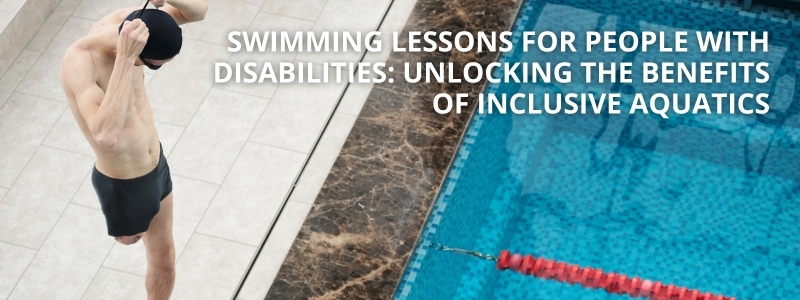
Swimming is often celebrated as a universal activity that transcends physical abilities and disabilities. It offers numerous physical, mental, and emotional benefits, making it an inclusive sport for people of all backgrounds and capabilities. Swimming lessons for people with disabilities are not only a testament to the power of inclusion but also a means to unlock the potential for improved health, self-confidence, and a sense of belonging.
Inclusive Aquatics: A Necessity, Not a Luxury
In recent years, there has been a growing awareness of the importance of inclusive aquatics programs. These programs are designed to accommodate individuals with various disabilities, ensuring that everyone has the opportunity to experience the joy and benefits of swimming. It's essential to recognize that swimming is not just a recreational activity; it can also be a life-saving skill.
Swimming lessons for people with disabilities are not just about physical exercise. They provide a safe and supportive environment where individuals can learn water safety skills, improve their physical fitness, and boost their self-esteem. Inclusive aquatics programs promote independence and self-reliance while fostering a sense of achievement.
Health Benefits of Swimming for People with Disabilities
- Physical Fitness: Swimming is a low-impact, full-body workout that helps improve cardiovascular health, strength, and flexibility. For individuals with disabilities, it can enhance muscle tone and joint mobility.
- Improved Coordination: Swimming encourages better coordination, balance, and control, which can be particularly beneficial for those with neurological or mobility impairments.
- Pain Management: The buoyancy of water reduces the impact on joints, making swimming an excellent choice for individuals with conditions like arthritis or chronic pain.
- Respiratory Health: Swimming involves controlled breathing techniques, which can help individuals with respiratory conditions enhance their lung function.
Boosting Self-Confidence and Self-Esteem
Participating in swimming lessons can have a profound impact on an individual's self-esteem and self-confidence, regardless of their disability. Achieving milestones in the pool, such as learning to float, mastering strokes, or swimming independently, can boost self-belief and provide a sense of accomplishment. This newfound confidence often extends beyond the pool, positively affecting other aspects of an individual's life.
Inclusion and Social Connection
Inclusive aquatics programs offer a unique opportunity for individuals with disabilities to connect with others who share similar challenges. These programs foster a sense of community and belonging, reducing feelings of isolation and loneliness. Participants often develop friendships and support networks that go beyond the poolside, enriching their lives in meaningful ways.
Creating Inclusive Aquatic Programs
To make swimming lessons truly inclusive, it's essential to consider a few key factors:
- Accessible Facilities: Ensure that swimming facilities are equipped with ramps, lifts, and other accessibility features to accommodate individuals with mobility impairments.
- Qualified Instructors: Trained instructors with experience in adaptive teaching methods are crucial to the success of inclusive aquatics programs.
- Individualized Instruction: Recognize that each person with a disability may have unique needs and abilities. Tailor lessons to meet these individual requirements.
- Supportive Environment: Create a welcoming and supportive atmosphere that encourages participants to feel comfortable and confident in the water.
Swimming lessons for people with disabilities are not just about learning to swim; they're about empowerment, inclusion, and improved well-being. By providing accessible and adaptive swimming programs, we can unlock the potential for physical fitness, increased self-confidence, and social connection for individuals with disabilities. The benefits of inclusive aquatics extend far beyond the pool, enriching lives and promoting a more inclusive and compassionate society.
